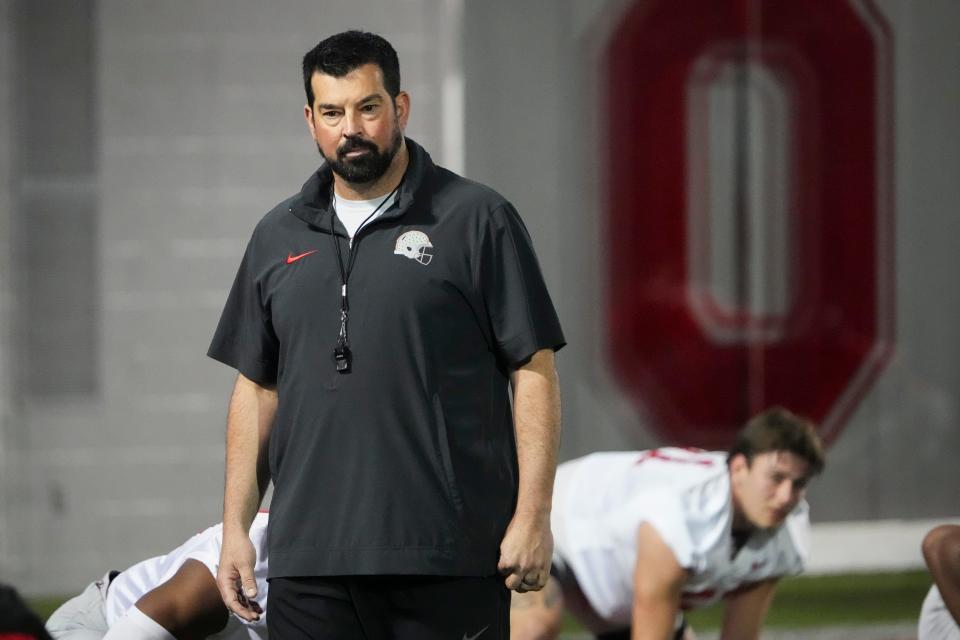How Ohio State football is handling special teams without a dedicated coordinator
A series of gaffes by Ohio State’s special teams last season culminated in January with the dismissal of the assistant tasked with coordinating them.
But instead of replacing Parker Fleming with another dedicated special teams coach, Ryan Day settled on another idea.
He opted to largely divide the responsibilities among a group of assistant coaches.

The arrangement has resulted in safeties coach Matt Guerrieri and linebackers coach James Laurinaitis leading punt and kickoff and co-offensive coordinator and wide receivers coach Brian Hartline and tight ends coach Keenan Bailey working on returns as the Buckeyes go through their second week of spring practice.
The structure of the staff is new to Day, who had designated one of his 10 on-field assistants to oversee the special teams units in each of his first five seasons at the helm of the program.
More Ohio State sports: Join the Ohio State Sports Insider text group with Bill Rabinowitz, Joey Kaufman Adam Jardy
Before Fleming spent three seasons as the special teams coordinator, it was Matt Barnes who held the title in addition to safeties coach.
But eschewing one effectively allowed Day to promote Laurinaitis from his role as a graduate assistant and balance the number of assistants between the offensive and defensive sides of the ball.
Suggestion came from Jim Tressel
It also came at the suggestion of Jim Tressel, the former Buckeyes coach who placed an emphasis on special teams during his decade-long tenure, at times referring to the punt as the most important play in the sport.
While Tressel tapped Luke Fickell as his special teams coach for 2002 and 2003, he did not have anyone holding that title for the following seasons, splitting up the duties among his position coaches.
After speaking with Tressel earlier in the offseason, Day chose to follow that blueprint, anticipating a level of enthusiasm among the roster.
“As a player, you want to really impress your position coach, you want to impress your coordinator, you want to press the head coach,” Day said. “Sometimes the special teams coordinator can be a little bit lower down the line, but when your position coach is up there, and he's coaching special teams, and being the head coach and being a very much a part of it with them, it provided a lot of buy in from the players. It really made sense to me.
“We're doing it a little bit different, but that that resonated with me, and I thought that was the right thing to do this year.”
Ohio State's special teams approach
In turning to a by-committee setup, Day has seen his involvement with special teams increase and also leaned on Rob Keys, a quality control coach who has worked with the special teams for the past two seasons.
Keys had been the coach of Findlay, a Division II program, for 11 seasons, before joining the Buckeyes in the off-field role.
A member of the support staff, Keys is unable to coach players during practice, but Day pointed out that he will have a valuable role behind the scenes.
“He's allowed to coach the coaches,” Day said, “and he can really do a lot of the legwork in terms of off the field stuff, breaking down the film, helping to get things organized as we get into the meetings.”
The reliance on a member of the support staff to guide special teams is not uncommon at the highest level of college football.
When Georgia won consecutive national championships in 2021 and 2022, it did so with Scott Cochran, the special teams coordinator, working in an off-field capacity.
Kirk Benedict, a special teams analyst who was promoted last month to replace Cochran as the coordinator, is continuing as a member of the support staff rather than as an on-field assistant.
Though the NCAA formed a committee several years ago that looked into expanding the size of staffs, teams remain capped to a head coach and 10 full-time assistants who can be hands on with players during practices.
Joey Kaufman covers Ohio State football for The Columbus Dispatch and can be reached at jkaufman@dispatch.com.
Get more Ohio State football news by listening to our podcasts
This article originally appeared on The Columbus Dispatch: Ohio State dividing special teams responsibilities among assistants

